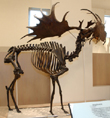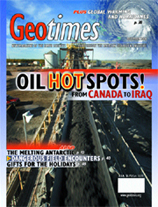
|
|
||||||||||||||
| |
|||||||||||||||
|
 Alaska's new pipeline
Alaska's new pipelineNew dates for old deer bones Carbon dioxide alchemy Antarctic ice connections Review of creationist book shelved Pyrite fossil preservation Acidic waters threaten sea life Vying for the North Pole Geophenomena For Students |
||||||||||||||
|
Seismic Success Story in Wyoming Citizens can be effective in promoting policy change: Take the case of a group of local citizens who rallied the support of Congress and their community in installing a seismic network. Wallace Ulrich Political Scene Beating Natural Hazards to the Punch Proactive strategies to mitigate natural hazards will develop a strong society prepared for any disaster. Emily Lehr Wallace and David R. Millar Geologic Column Was Chicken Little Right? The sky is falling on science and technology in the United States — or is it? Fred Schwab |
Geofellows in D.C. Energy & Resources
|
||||||||||||||
 ON
THE COVER ON
THE COVER Canada contains large deposits of tar-like oil sands, which give the country the world's second largest proven crude oil reserves. Mining for the sands, however, is technologically challenging. Read more on page 22 and 32, and read throughout the issue about other oil "hot spots" and new technologies. Photo is courtesy of Syncrude Canada. Upper right: Hurricane Charley was the first of four large hurricanes to hit Florida this past August and September. Some researchers say that the occurrence of extreme events may increase in coming years as the climate warms. Read more on page 38. Image courtesy of NASA/Orbimage. |
Later this month: Geologic Column: Was Chicken Little Right? January: Geology in Criminal Investigations
|
| SUBSCRIBE | CLASSIFIEDS | ADVERTISE | FOR AUTHORS | CONTACT US | ARCHIVE | SEARCH |
 |
Geotimes Home | AGI Home | Information Services | Geoscience Education | Public Policy | Programs | Publications | Careers |